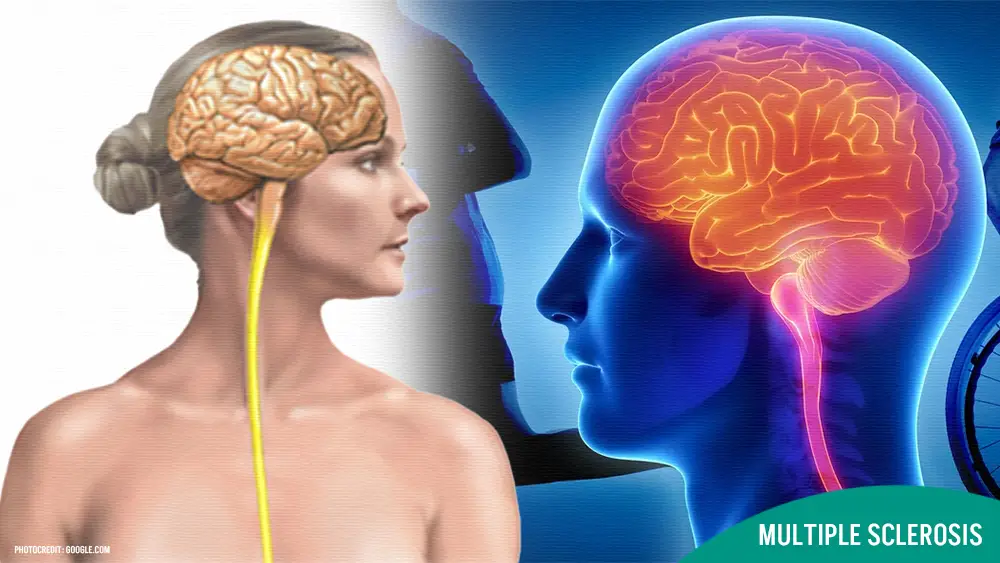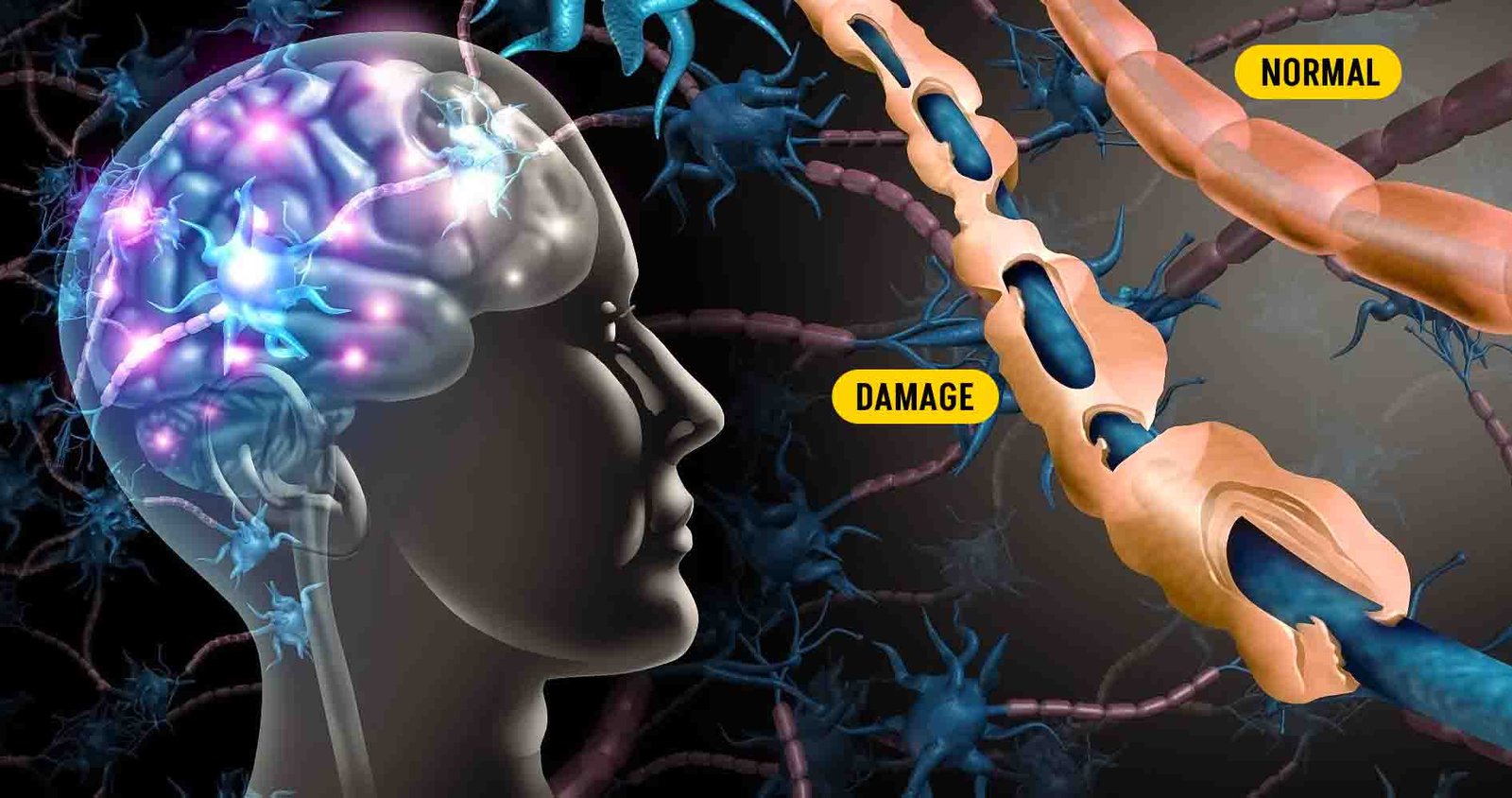
NEUROSCIENCE
Multiple Sclerosis (MS): Understanding Symptoms, Causes, Treatment, and Research
-
Rahul Priydarss
Explore Multiple Sclerosis (MS) with insights into symptoms, causes, treatments, and research. Learn about its impact, types, and management strategies. Stay updated on the latest breakthroughs in MS research. Empower yourself to navigate MS effectively and support loved ones living with the condition. Empower yourself with resources for staying informed and supporting loved ones living with MS. Take control of your journey with MS by understanding its complexities and taking proactive steps towards better management and improved quality of life.
Introduction to Multiple Sclerosis (MS):
Multiple sclerosis (MS) is a chronic autoimmune disease that affects the central nervous system (CNS), which includes the brain and spinal cord. In MS, the body’s immune system mistakenly attacks the protective covering of nerve fibers, called myelin, leading to inflammation, damage, and scar tissue formation (sclerosis) in multiple areas of the CNS.
The exact cause of MS is not fully understood, but it is believed to involve a combination of genetic predisposition and environmental factors triggering an abnormal immune response. Factors such as viral infections, vitamin D deficiency, and smoking have been implicated in increasing the risk of developing MS.

Table of Contents
Understanding the Causes of MS:
The exact causes of multiple sclerosis (MS) are not fully understood, but researchers believe that a combination of genetic, environmental, and immune system factors play a role in its development.
Genetic Factors: Although MS is not directly inherited, there is evidence to suggest a genetic component. Individuals with a family history of MS have a higher risk of developing the disease compared to those without such a history. Certain genes associated with immune system function and regulation, such as those within the human leukocyte antigen (HLA) region, have been implicated in increasing susceptibility to MS.
Environmental Triggers: Environmental factors may also contribute to the development of MS, particularly in individuals with a genetic predisposition. These triggers could include viral infections, such as the Epstein-Barr virus (EBV), which has been linked to an increased risk of MS. Other environmental factors, such as low levels of vitamin D, smoking, and exposure to certain toxins, may also play a role in triggering or exacerbating the disease.
Immune System Dysfunction: MS is classified as an autoimmune disease, meaning that the immune system mistakenly attacks healthy tissues in the body. In MS, the immune system targets the myelin sheath, a protective covering of nerve fibers in the central nervous system (CNS). This immune-mediated damage leads to inflammation, demyelination, and ultimately, the formation of scar tissue (sclerosis) in the CNS. The exact triggers that cause the immune system to target myelin are still under investigation, but it is believed that a combination of genetic susceptibility and environmental factors may disrupt immune system regulation, leading to an abnormal immune response.
Types of Multiple Sclerosis:
Multiple sclerosis (MS) manifests in different forms, each with its own characteristics and disease progression patterns. The main types of MS include.
Relapsing-Remitting MS (RRMS): This is the most common form of MS, affecting approximately 85% of individuals diagnosed with the disease. RRMS is characterized by clearly defined episodes of new or worsening neurological symptoms, known as relapses or exacerbations, followed by periods of partial or complete recovery (remissions). During remission, there is typically a reduction or absence of symptoms, although some residual symptoms may persist. Relapses can vary in duration and severity and may involve a wide range of neurological symptoms.
Primary Progressive MS (PPMS): PPMS accounts for around 10-15% of MS cases. Unlike RRMS, PPMS is characterized by a gradual and steady worsening of neurological function from the onset of symptoms, without distinct relapses or remissions. Individuals with PPMS may experience occasional plateaus or temporary improvements in symptoms, but these are generally followed by continued disease progression. PPMS tends to be more common in older individuals and is often associated with a poorer prognosis compared to RRMS.
Secondary Progressive MS (SPMS): SPMS typically follows an initial phase of RRMS in many individuals, although not all individuals with RRMS will develop SPMS. In SPMS, there is a transition from the relapsing-remitting phase to a progressive phase characterized by a gradual worsening of neurological function, with or without occasional relapses. Disease progression in SPMS may occur steadily or intermittently, with periods of stability interspersed with periods of worsening symptoms. Treatment strategies for SPMS may involve disease-modifying therapies aimed at slowing down disease progression and managing symptoms.
Progressive-Relapsing MS (PRMS): PRMS is the least common form of MS, accounting for a small percentage of cases. In PRMS, there is a steady worsening of neurological function from the onset of symptoms, similar to PPMS, but with occasional relapses or exacerbations superimposed on the progressive course of the disease. Individuals with PRMS may experience periods of relapse followed by further progression of disability without recovery. Managing PRMS may involve a combination of disease-modifying therapies and symptomatic treatments to address relapses and manage ongoing symptoms.
Symptoms of Multiple Sclerosis (MS):
Multiple sclerosis (MS) can cause a wide range of symptoms that vary in severity and can affect different parts of the body. The specific symptoms experienced by individuals with MS depend on the location and extent of damage to the central nervous system (CNS). Some common symptoms of MS include.
Fatigue: This is one of the most common symptoms of MS and can significantly impact daily functioning. Fatigue in MS is often described as overwhelming and not relieved by rest.
Muscle Weakness: Weakness or stiffness in the muscles, especially in the legs, can make walking difficult. This symptom may contribute to problems with balance and coordination.
Numbness or Tingling Sensations: Many individuals with MS experience abnormal sensations such as numbness, tingling, or pins-and-needles sensations, often in the arms, legs, face, or trunk.
Spasticity: Muscle stiffness and spasms, which can be painful and interfere with movement, are common in MS. Spasticity may affect muscles in the limbs, causing stiffness or involuntary muscle contractions.
Balance and Coordination Problems: MS can affect the areas of the brain and spinal cord responsible for balance and coordination, leading to difficulties with walking, clumsiness, and a tendency to stumble or fall.
Vision Problems: MS can cause various vision disturbances, including blurred or double vision, eye pain, and rapid eye movements (nystagmus). Optic neuritis, inflammation of the optic nerve, is a common vision problem associated with MS.
Cognitive Changes: MS can affect cognitive function, leading to difficulties with memory, concentration, attention, and problem-solving. Some individuals may also experience changes in mood or emotional well-being.
Bladder and Bowel Dysfunction: MS can disrupt the normal function of the bladder and bowel, leading to symptoms such as urinary urgency, frequency, incontinence, or difficulty emptying the bladder. Constipation and bowel incontinence may also occur.
Sexual Dysfunction: MS can impact sexual function in both men and women, causing issues such as decreased libido, erectile dysfunction, vaginal dryness, and difficulty achieving orgasm.
Speech and Swallowing Difficulties: Damage to the nerves controlling the muscles of the mouth and throat can result in speech problems, such as slurred speech or difficulty articulating words, as well as swallowing difficulties.

Diagnosis of Multiple Sclerosis (MS):
Diagnosing multiple sclerosis (MS) can be challenging because its symptoms can vary widely and mimic those of other neurological conditions. However, healthcare professionals typically use a combination of medical history, neurological examination, and diagnostic tests to make an accurate diagnosis. The diagnostic process for MS may involve the following steps.
Medical History: The healthcare provider will take a detailed medical history, including information about the onset, duration, and progression of symptoms, as well as any relevant family history of MS or other autoimmune diseases.
Neurological Examination: A thorough neurological examination will be conducted to assess muscle strength, coordination, reflexes, sensation, and other neurological functions. Specific tests may be performed to evaluate vision, balance, and cognitive function.
Diagnostic Tests:
- Magnetic Resonance Imaging (MRI): MRI is the most commonly used imaging test for diagnosing MS. It provides detailed images of the brain and spinal cord, allowing healthcare professionals to identify areas of inflammation, demyelination, and scar tissue (lesions or plaques) characteristic of MS.
- Lumbar Puncture (Spinal Tap): In some cases, a lumbar puncture may be performed to analyze the cerebrospinal fluid (CSF) for abnormalities, such as elevated levels of immune cells and proteins. These abnormalities may indicate inflammation in the CNS, supporting the diagnosis of MS.
- Evoked Potentials: Evoked potential tests measure the electrical activity in the brain in response to stimuli such as visual, auditory, or sensory stimuli. Abnormalities in these responses may suggest damage to nerve pathways caused by MS.
- Blood Tests: Blood tests are typically used to rule out other conditions that may cause similar symptoms, such as vitamin deficiencies, infections, or other autoimmune diseases.
Diagnostic Criteria: The diagnosis of MS is based on specific diagnostic criteria established by international consensus guidelines, such as the McDonald criteria. These criteria take into account clinical symptoms, imaging findings, and other diagnostic test results to determine whether the characteristic features of MS are present.
Exclusion of Other Conditions: It’s important for healthcare professionals to rule out other possible causes of symptoms, such as stroke, brain tumor, lupus, Lyme disease, or neuromyelitis optica, which can sometimes mimic MS.
Treatment Options for Multiple Sclerosis (MS):
The treatment of multiple sclerosis (MS) aims to reduce the frequency and severity of relapses, slow down the progression of the disease, manage symptoms, and improve quality of life. Treatment options for MS include.
Disease-Modifying Therapies (DMTs):
- DMTs are medications that target the underlying immune system dysfunction in MS to reduce inflammation, prevent new lesions from forming, and delay disease progression.
- There are several different types of DMTs available, including interferon beta medications, glatiramer acetate, oral medications such as fingolimod and dimethyl fumarate, and newer monoclonal antibodies such as natalizumab, ocrelizumab, and alemtuzumab.
- The choice of DMT depends on factors such as disease subtype, disease severity, individual response to treatment, and potential side effects.
Symptomatic Treatments: Symptomatic treatments are used to manage specific symptoms of MS and improve quality of life. These may include.
- Medications for spasticity, such as baclofen, tizanidine, or dalfampridine (to improve walking).
- Medications for neuropathic pain, such as gabapentin or pregabalin.
- Medications to treat bladder dysfunction, such as anticholinergic drugs or beta-3 agonists.
- Physical therapy, occupational therapy, and speech therapy to improve mobility, function, and communication skills.
- Assistive devices such as braces, canes, or wheelchairs to aid with mobility and independence.
- Counseling or psychotherapy to address emotional and psychological aspects of living with MS.
Relapse Management:
- During relapses or exacerbations of MS, corticosteroids such as intravenous methylprednisolone or oral prednisone may be prescribed to reduce inflammation and speed up recovery.
- Plasma exchange (plasmapheresis) may be considered for severe relapses that do not respond to corticosteroid treatment.
Supportive Care:
- Supportive care focuses on addressing the overall well-being of individuals with MS and may involve interventions such as nutritional counseling, pain management, and social support services.
- Regular monitoring of disease progression, cognitive function, and quality of life is important for providing comprehensive care to individuals with MS.
Healthy Lifestyle Choices:
- Adopting a healthy lifestyle can help individuals with MS manage their symptoms and improve overall well-being. This may include regular exercise, a balanced diet, stress management techniques, adequate rest and sleep, and avoiding smoking and excessive alcohol consumption.
Dealing With Multiple Sclerosis (MS):
Dealing with multiple sclerosis (MS) involves various strategies to manage the physical, emotional, and practical aspects of the disease. Here are some specific ways to cope with MS.
Education: Learn about MS, its symptoms, treatments, and how it may affect your life. Knowledge empowers you to make informed decisions about your health and treatment options.
Support Network: Surround yourself with supportive family, friends, and healthcare professionals who understand your condition. Joining support groups or online communities can also provide valuable encouragement and understanding.
Healthy Lifestyle: Focus on maintaining a healthy lifestyle by eating a balanced diet, engaging in regular exercise, getting enough rest, and managing stress. These habits can help manage symptoms and improve overall well-being.
Medication Adherence: Take your prescribed medications as directed by your healthcare provider. Adhering to your treatment plan can help control symptoms, reduce relapses, and slow disease progression.
Symptom Management: Work with your healthcare team to manage MS symptoms such as fatigue, pain, spasticity, and cognitive difficulties. Explore various treatments and strategies to alleviate symptoms and improve quality of life.
Adaptations and Accommodations: Make necessary adaptations to your environment, such as installing grab bars, ramps, or other assistive devices to improve accessibility. Modify tasks or activities to accommodate any physical limitations you may have.
Emotional Support: Acknowledge and address the emotional impact of MS. Seek support from a therapist, counselor, or psychologist if you’re struggling with depression, anxiety, or other emotional challenges.
Mindfulness and Relaxation: Practice mindfulness, meditation, or relaxation techniques to reduce stress, promote emotional well-being, and cope with the uncertainties of living with MS.
Set Realistic Goals: Set achievable goals for yourself, taking into account your abilities and limitations. Break larger tasks into smaller, manageable steps, and celebrate your accomplishments along the way.
Advocate for Yourself: Be an advocate for your own health by communicating openly with your healthcare team, asking questions, and expressing your needs and concerns. Take an active role in decision-making regarding your treatment and care.
Stay Positive: Maintain a positive attitude and focus on the things you can control. Find joy in everyday moments, cultivate gratitude, and seek out sources of inspiration and hope.
Plan for the Future: Consider how MS may impact your future and make necessary plans, such as financial planning, advance directives, and long-term care arrangements, to ensure your needs are met.
Current Research and Advancement in Multiple Sclerosis (MS):
There’s exciting progress being made in MS research, with a focus on improving treatment efficacy, offering more options, and ultimately, finding a cure. Here are some key areas of advancement.
Newer DMTs: Researchers are constantly developing new Disease-Modifying Therapies (DMTs) with improved effectiveness and fewer side effects.
- BTK inhibitors: This new class of drugs targets B-cells and microglia, cells involved in the autoimmune attack on myelin. Several BTK inhibitors are undergoing phase III clinical trials for both relapsing and progressive forms of MS.
- Ublituximab: This next-generation anti-CD20 monoclonal antibody shows promise in phase II and III trials, potentially offering a convenient alternative to other B-cell depleting therapies due to its shorter infusion time.
Understanding Progressive MS: Progressive MS is a more complex form with limited treatment options. Research is ongoing to identify specific mechanisms of this progression and develop targeted therapies.
Stem Cell Therapy: Hematopoietic stem cell transplantation (HSCT) is a highly effective but aggressive treatment for MS. Researchers are exploring ways to make it safer and more accessible.
Early Diagnosis and Risk Prediction: New genetic and other biomarkers are being investigated to diagnose MS earlier and identify individuals at high risk of developing the disease.
Repairing Myelin Damage: Myelin repair is a critical area of research. Scientists are exploring various strategies, including stimulating the body’s own repair mechanisms and developing drugs to promote remyelination.
Some resources to updated on the latest MS research.
- National MS Society: Research News & Progress: https://www.nationalmssociety.org/Research
- Multiple Sclerosis Research News: https://www.sciencedaily.com/news/mind_brain/multiple_sclerosis/
- Latest research news – MS Society: https://www.mssociety.org.uk/research/latest-research
FAQs about Multiple Sclerosis (MS):
A1: While genetics can play a role in predisposing individuals to MS, it is not directly inherited in a Mendelian fashion. Environmental factors also contribute to its development.
A2: Currently, there is no cure for MS, but various treatments are available to manage symptoms and slow disease progression.
A3: Risk factors for MS include genetic predisposition, environmental triggers such as viral infections and vitamin D deficiency, and certain lifestyle factors like smoking.
A4: Multiple Sclerosis MS symptoms can vary widely and may impact mobility, cognition, vision, and emotional well-being, making daily activities challenging for some individuals.
A5: Providing emotional support, helping with daily tasks, and encouraging participation in treatment and support programs can be immensely beneficial for individuals with MS.
-Please remember, to always consult with healthcare professionals or Doctors for personalized advice related to medical conditions.
Conclusion:
Multiple sclerosis is a complex and challenging condition that impacts the lives of millions worldwide. By understanding its causes, symptoms, diagnosis, and treatment options, individuals with MS can take proactive steps to manage their condition and live fulfilling lives.




